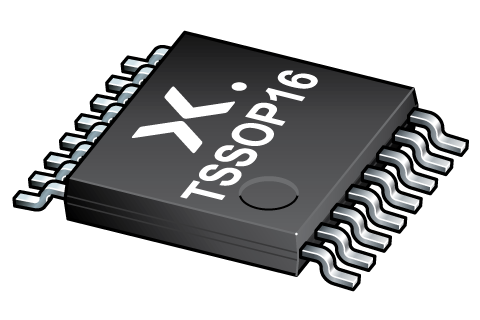
Register once, drag and drop ECAD models into your CAD tool and speed up your design.
Click here for more information74HC191DB
Presettable synchronous 4-bit binary up/down counter
The 74HC191 is an asynchronously presettable 4-bit binary up/down counter. It contains four master/slave flip-flops with internal gating and steering logic to provide asynchronous preset and synchronous count-up and count-down operation. Asynchronous parallel load capability permits the counter to be preset to any desired value. Information present on the parallel data inputs (D0 to D3) is loaded into the counter and appears on the outputs when the parallel load (PL) input is LOW. This operation overrides the counting function. Counting is inhibited by a HIGH level on the count enable (CE) input. When CE is LOW internal state changes are initiated synchronously by the LOW-to-HIGH transition of the clock input. The up/down (U/D) input signal determines the direction of counting as indicated in the function table. The CE input may go LOW when the clock is in either state, however, the LOW-to-HIGH CE transition must occur only when the clock is HIGH. Also, the U/D input should be changed only when either CE or CP is HIGH. Overflow/underflow indications are provided by two types of outputs, the terminal count (TC) and ripple clock (RC). The TC output is normally LOW and goes HIGH when a circuit reaches zero in the count-down mode or reaches '15' in the count-up-mode. The TC output will remain HIGH until a state change occurs, either by counting or presetting, or until U/D is changed. Do not use the TC output as a clock signal because it is subject to decoding spikes. The TC signal is used internally to enable the RC output. When TC is HIGH and CE is LOW, the RC output follows the clock pulse (CP). This feature simplifies the design of multistage counters as shown in Figure 1 and Figure 2. In Figure 1, each RC output is used as the clock input to the next higher stage. It is only necessary to inhibit the first stage to prevent counting in all stages, since a HIGH on CE inhibits the RC output pulse. The timing skew between state changes in the first and last stages is represented by the cumulative delay of the clock as it ripples through the preceding stages. This can be a disadvantage of this configuration in some applications. Figure 2 shows a method of causing state changes to occur simultaneously in all stages. The RC outputs propagate the carry/borrow signals in ripple fashion and all clock inputs are driven in parallel. In this configuration the duration of the clock LOW state must be long enough to allow the negative-going edge of the carry/borrow signal to ripple through to the last stage before the clock goes HIGH. Since the RC output of any package goes HIGH shortly after its CP input goes HIGH there is no such restriction on the HIGH-state duration of the clock. In Figure 3, the configuration shown avoids ripple delays and their associated restrictions. Combining the TC signals from all the preceding stages forms the CE input for a given stage. An enable must be included in each carry gate in order to inhibit counting. The TC output of a given stage it not affected by its own CE signal therefore the simple inhibit scheme of Figure 1 and Figure 2 does not apply. Inputs include clamp diodes. This enables the use of current limiting resistors to interface inputs to voltages in excess of VCC.
Alternatives
Features and benefits
Wide supply voltage range from 2.0 to 6.0 V
CMOS low power dissipation
High noise immunity
Latch-up performance exceeds 100 mA per JESD 78 Class II Level B
CMOS input levels
Synchronous reversible counting
Asynchronous parallel load
Count enable control for synchronous expansion
Single up/down control input
Complies with JEDEC standards:
JESD8C (2.7 V to 3.6 V)
JESD7A (2.0 V to 6.0 V)
ESD protection:
HBM: ANSI/ESDA/JEDEC JS-001 class 2 exceeds 2000 V
CDM: ANSI/ESDA/JEDEC JS-002 class C3 exceeds 1000 V
Specified from -40 °C to +85 °C and -40 °C to +125 °C
封装
下表中的所有产品型号均已停产 。
| 型号 | 可订购的器件编号,(订购码(12NC)) | 状态 | 标示 | 封装 | 外形图 | 回流焊/波峰焊 | 包装 |
|---|---|---|---|---|---|---|---|
| 74HC191DB | 74HC191DB,112 (935188600112) |
Obsolete | no package information | ||||
文档 (3)
| 文件名称 | 标题 | 类型 | 日期 |
|---|---|---|---|
| 74HC191 | Presettable synchronous 4-bit binary up/down counter | Data sheet | 2024-03-14 |
| AN11044 | Pin FMEA 74HC/74HCT family | Application note | 2019-01-09 |
| HCT_USER_GUIDE | HC/T User Guide | User manual | 1997-10-31 |
Longevity
The Nexperia Longevity Program is aimed to provide our customers information from time to time about the expected time that our products can be ordered. The NLP is reviewed and updated regularly by our Executive Management Team. View our longevity program here.
模型
No documents available
How does it work?
The interactive datasheets are based on the Nexperia MOSFET precision electrothermal models. With our interactive datasheets you can simply specify your own conditions interactively. Start by changing the values of the conditions. You can do this by using the sliders in the condition fields. By dragging the sliders you will see how the MOSFET will perform at the new conditions set.
